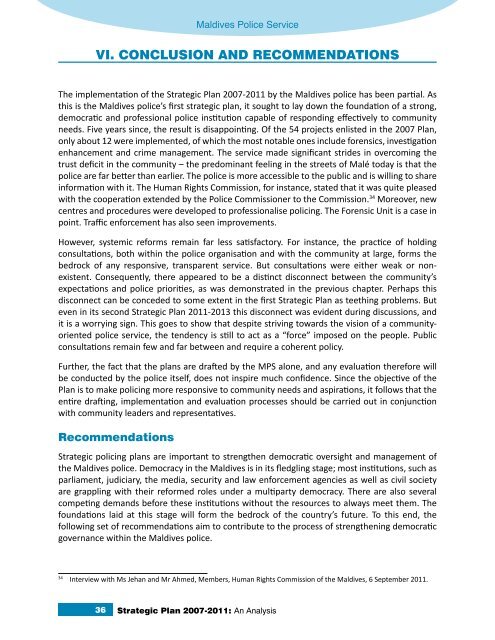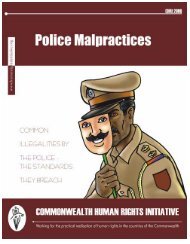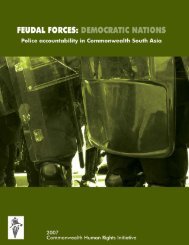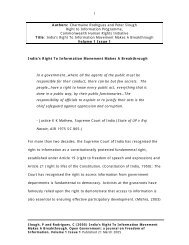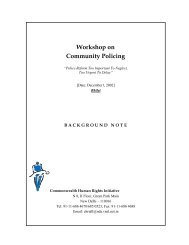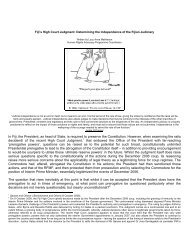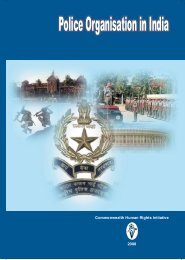Implementation of the Maldives Police Service Strategic Plan
Implementation of the Maldives Police Service Strategic Plan
Implementation of the Maldives Police Service Strategic Plan
Create successful ePaper yourself
Turn your PDF publications into a flip-book with our unique Google optimized e-Paper software.
<strong>Maldives</strong> <strong>Police</strong> <strong>Service</strong>VI. Conclusion and RecommendationsThe implementation <strong>of</strong> <strong>the</strong> <strong>Strategic</strong> <strong>Plan</strong> 2007-2011 by <strong>the</strong> <strong>Maldives</strong> police has been partial. Asthis is <strong>the</strong> <strong>Maldives</strong> police’s first strategic plan, it sought to lay down <strong>the</strong> foundation <strong>of</strong> a strong,democratic and pr<strong>of</strong>essional police institution capable <strong>of</strong> responding effectively to communityneeds. Five years since, <strong>the</strong> result is disappointing. Of <strong>the</strong> 54 projects enlisted in <strong>the</strong> 2007 <strong>Plan</strong>,only about 12 were implemented, <strong>of</strong> which <strong>the</strong> most notable ones include forensics, investigationenhancement and crime management. The service made significant strides in overcoming <strong>the</strong>trust deficit in <strong>the</strong> community – <strong>the</strong> predominant feeling in <strong>the</strong> streets <strong>of</strong> Malé today is that <strong>the</strong>police are far better than earlier. The police is more accessible to <strong>the</strong> public and is willing to shareinformation with it. The Human Rights Commission, for instance, stated that it was quite pleasedwith <strong>the</strong> cooperation extended by <strong>the</strong> <strong>Police</strong> Commissioner to <strong>the</strong> Commission. 34 Moreover, newcentres and procedures were developed to pr<strong>of</strong>essionalise policing. The Forensic Unit is a case inpoint. Traffic enforcement has also seen improvements.However, systemic reforms remain far less satisfactory. For instance, <strong>the</strong> practice <strong>of</strong> holdingconsultations, both within <strong>the</strong> police organisation and with <strong>the</strong> community at large, forms <strong>the</strong>bedrock <strong>of</strong> any responsive, transparent service. But consultations were ei<strong>the</strong>r weak or nonexistent.Consequently, <strong>the</strong>re appeared to be a distinct disconnect between <strong>the</strong> community’sexpectations and police priorities, as was demonstrated in <strong>the</strong> previous chapter. Perhaps thisdisconnect can be conceded to some extent in <strong>the</strong> first <strong>Strategic</strong> <strong>Plan</strong> as teething problems. Buteven in its second <strong>Strategic</strong> <strong>Plan</strong> 2011-2013 this disconnect was evident during discussions, andit is a worrying sign. This goes to show that despite striving towards <strong>the</strong> vision <strong>of</strong> a communityorientedpolice service, <strong>the</strong> tendency is still to act as a “force” imposed on <strong>the</strong> people. Publicconsultations remain few and far between and require a coherent policy.Fur<strong>the</strong>r, <strong>the</strong> fact that <strong>the</strong> plans are drafted by <strong>the</strong> MPS alone, and any evaluation <strong>the</strong>refore willbe conducted by <strong>the</strong> police itself, does not inspire much confidence. Since <strong>the</strong> objective <strong>of</strong> <strong>the</strong><strong>Plan</strong> is to make policing more responsive to community needs and aspirations, it follows that <strong>the</strong>entire drafting, implementation and evaluation processes should be carried out in conjunctionwith community leaders and representatives.Recommendations<strong>Strategic</strong> policing plans are important to streng<strong>the</strong>n democratic oversight and management <strong>of</strong><strong>the</strong> <strong>Maldives</strong> police. Democracy in <strong>the</strong> <strong>Maldives</strong> is in its fledgling stage; most institutions, such asparliament, judiciary, <strong>the</strong> media, security and law enforcement agencies as well as civil societyare grappling with <strong>the</strong>ir reformed roles under a multiparty democracy. There are also severalcompeting demands before <strong>the</strong>se institutions without <strong>the</strong> resources to always meet <strong>the</strong>m. Thefoundations laid at this stage will form <strong>the</strong> bedrock <strong>of</strong> <strong>the</strong> country’s future. To this end, <strong>the</strong>following set <strong>of</strong> recommendations aim to contribute to <strong>the</strong> process <strong>of</strong> streng<strong>the</strong>ning democraticgovernance within <strong>the</strong> <strong>Maldives</strong> police.34Interview with Ms Jehan and Mr Ahmed, Members, Human Rights Commission <strong>of</strong> <strong>the</strong> <strong>Maldives</strong>, 6 September 2011.36<strong>Strategic</strong> <strong>Plan</strong> 2007-2011: An Analysis


